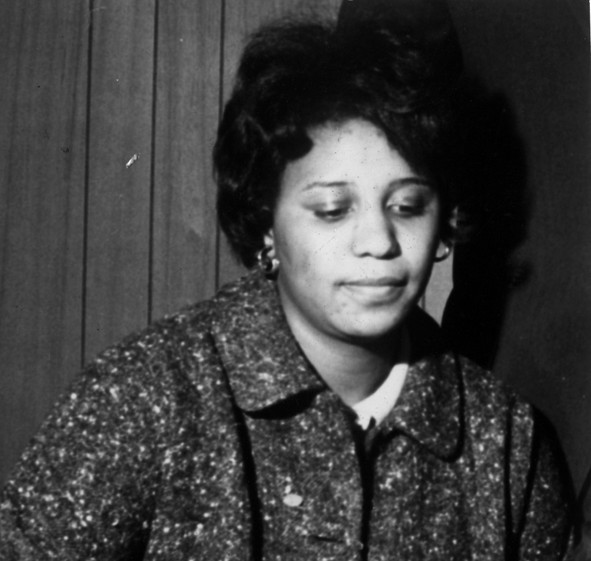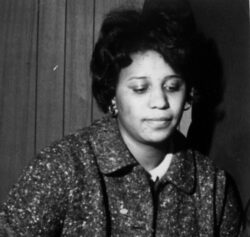Oretha Castle Haley
Oretha Castle Haley defied rigid southern gender and racial constructs to become one of Louisiana's leading civil rights, women's rights, and human rights activists.

Courtesy of Amistad Research Center at Tulane University.
A black and white reproduction of a photograph of civil rights activist, Oretha Castle Haley.
Defying rigid, socially proscribed southern gender and racial role constructions, Oretha Castle Haley became one of Louisiana’s leading civil rights, women’s rights, and human rights activists. She was a founding member, and then president, of the New Orleans Chapter of the Congress of Racial Equality (CORE), one of the most active organizations in the civil rights movement. Later in her career, Haley advocated better health care for New Orleans black citizens and helped found the New Orleans Sickle Cell Anemia Foundation.
Born in Oakland, Tennessee, on July 22, 1939, Oretha Castle was the daughter of Virgie Castle. The family moved to New Orleans when she was seven years old. Haley’s father found work as a longshoreman and her mother, Virgie, worked as a barmaid for celebrated restaurateurs and supporters of the New Orleans’s civil rights movement, Leah and Dooky Chase. Oretha graduated from Joseph S. Clark High School in 1958 and a year later enrolled at Southern University of New Orleans (SUNO).
She began working with the local civil rights movement that year, picketing with the Consumer’s League of Greater New Orleans, which demanded the increased hiring of black salespeople and equal access to the stores for black customers. In the summer of 1960, she worked with members of the National Association for the Advancement of Colored People’s Youth Council, and co-founded the CORE chapter in New Orleans. Haley served as CORE president from 1961 to 1964, an unusual position for a black woman in a major civil rights organization.
In 1960, police arrested Haley, along with three male activists, for picketing and sitting-in, as well as distributing leaflets calling for a boycott of Woolworths. The four were charged with advocating opposition to the state of Louisiana and conspiracy to commit criminal anarchy. The case, Lombard, et al v. Louisiana, was hailed as one of the most important US Supreme Court cases of the civil rights movement. Justice Earl Warren overturned an earlier state conviction, arguing that it violated the 14th Amendment and was, essentially, an attempt to “quash the sit-ins.”
Between 1961 and 1964, Haley participated in numerous protests, demonstrations, and sit-ins fighting for racial equality. In 1963, she was part of a highly visible march to New Orleans City Hall, where she was carried out of the building in a chair by police when she and her sister, Doris, refused to disperse. In the spring of 1964, Oretha left the New Orleans CORE office to work as a field secretary in the rural state movement. Despite the extreme dangers in towns like Bogalusa and Monroe, Oretha worked in voter registration clinics, canvassed, and directed a number of local field offices. In November 1964, CORE appointed her field director for all of northern Louisiana.
In 1965, she returned to New Orleans to work on antipoverty programs in the city created through Lyndon B. Johnson’s War on Poverty initiative. She also continued to work on civil rights initiatives and, in 1966, successfully took on the New Orleans Recreation Department to integrate the public parks system. A year later she married nationally known civil rights activist Richard Haley.
In 1970, as a leader in the Black Organization for Leadership Development, she successfully led a campaign to stop construction of a bridge that would have displaced 3,500 people, 90 percent of whom were black. In 1971, Dorothy Mae Taylor, Louisiana’s first black female legislator, chose Oretha to head her successful election campaign. Throughout the 1980s, Oretha served as a deputy administrator at Charity Hospital, where she worked to institute reforms that created better health care for black New Orleans citizens. In addition, she helped found the New Orleans Sickle Cell Anemia Foundation.
Oretha Castle Haley died after a long battle with ovarian cancer on October 10, 1987. Her husband and her four sons survived her. In 1989, the city of New Orleans honored her memory and works in the Louisiana civil rights movement by renaming Dryades Street, the site of many a civil rights demonstration, Oretha Castle Haley Boulevard.
